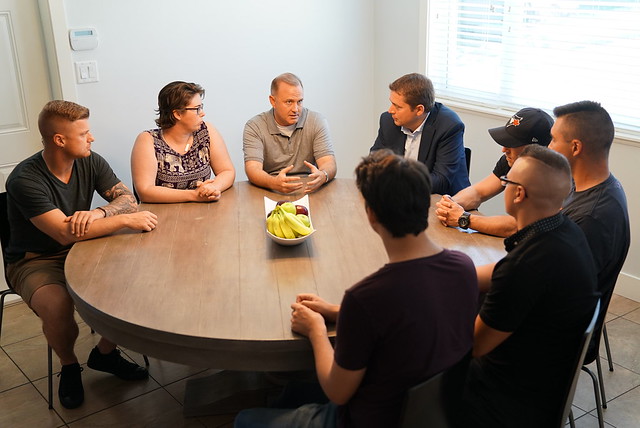
Image Credit: Andrew Scheer
So what are the most important skills for a negotiator to have? There are many of them; however, hopefully we’d all agree that the bargaining skills and tactics for building trust while negotiating are among the most important. Each time that we start a negotiation we all share the same hopes, dreams and goals: we want to share information, build a relationship, and be treated fairly by the other side. This is all fine; however, all too often when talks get started, most of us have also had the experience of holding back information, viewing the other side’s behavior with suspicion, and feeling distrusted by them. How can you get negotiations with the other side off to a trusting start?
Always Take The Time To Use Your Network
I hope that it almost goes without saying that the simplest way to make a negotiation feel safe and trusting is to choose your new negotiating counterparts wisely. Look, I understand that you may not always be able to choose whom you negotiate with, but when you can, seek out referrals and recommendations from those you already trust who have negotiated with them. Not only are you likely to get some promising leads from those in your network, but when the other side knows that a friend or colleague recommended them, they will probably treat you better and trust you more than they would if you didn’t share a common bond.
You do need to be careful. You don’t want to put all your faith in someone just because they have a friend’s seal of approval. Something else that you need to keep in mind is that dealing exclusively within your network could cause you to miss out on promising new negotiating opportunities. When it makes sense to reach out to strangers, be sure to check their references carefully and verify their claims with independent sources.
Always Attempt To Build Rapport Before Starting To Negotiate
All negotiators know that research has shown that the other side tends to respond to your actions with similar actions. If others cooperate with us and treat us with respect, likewise we tend to respond in kind. If the other side seems guarded and competitive, we are likely to behave that way ourselves. What’s more, things can get out of hand if such exchanges spiral into vicious cycles (those characterized by contention and suspicion) or may become deal makers by becoming virtuous cycles (those in which cooperation and goodwill prevail).
I understand that you are busy; however, the reciprocal nature of trust reinforces the value of taking time to get to know the other party and build rapport before you begin to negotiate. What you need to realize is that you can’t form a bond simply by exchanging a few friendly e-mails before meeting in person. A much better approach is to try to forge a personal connection by meeting for an informal meal prior to starting formal negotiations.
Negotiators need to understand that even just a few minutes of small talk can go a long way. Research has shown that negotiators who spent just five minutes chatting on the phone—without discussing issues related to the upcoming negotiation—felt more cooperative toward their counterparts, shared more information, made fewer threats, and developed more trust in a subsequent e-mail negotiation than did pairs of negotiators who skipped this telephone small talk.
Prior To Starting A Negotiation You Need To Set An Appropriate Trust Default
So look, I always like to think highly of the person that I’ll be negotiating with; however, I have to keep in mind that they are out to get the best deal for themselves. What this means is that it would be a mistake to assume that if you’ve vetted the other side and spent time getting to know each other that you can trust them implicitly. Negotiators often make the mistake of assuming a fully trusting relationship with the other side. When things go wrong, they are left feeling shocked, hurt, and perhaps a bit lighter in the wallet. Keep in mind that negotiators can feel trust has been broken even when neither side has behaved with deliberate deception.
Just because we feel that something wrong was done to us does not necessarily mean that is what happened. Conflicts of interest, the common tendency to claim credit for someone’s contributions, and other cognitive biases can lead us to view the same events differently and jump to the false conclusion that trust has been broken. Since we’d prefer that this not happen, one way to reduce the odds of trust betrayal is to change the “trust default” that negotiators hold when talks begin. As substantive talks begin, take time to discuss ground rules, including your basic beliefs about trust. Explain that you are a conservative risk taker who would like to build trust slowly, over time.
What All Of This Means For You
Although as negotiators we can get caught up in all of the negotiation styles and negotiating techniques that we want to use during our next principled negotiation, it turns out that one of the most important things that we can both bring to and find in our negotiation is trust. All too often we feel that we don’t trust the other side, they may feel the same way, and the negotiating suddenly becomes much harder to do. We need to find ways to keep the trust in the negotiations.
The people that we will be negotiating with have probably been involved in negotiations before. What we need to do is to reach out to our networks and find out what other people think of the person that we’ll be negotiating with. We have to keep in mind that we’ll have to be willing to negotiate with people that our network may not know about and when we do it will be our responsibility to do our homework on them. Studies have shown that if we take time to build rapport with the other side before the negotiation starts, then things will go more smoothly. Something as simple as a 5 minute phone call can make a significant difference in the outcome that we are able to achieve. We have to make sure that we don’t go into a negotiation trusting the other side too much. Establishing trust defaults can help us to establish ground rules that will serve both sides well.
Trust is a strange beast. It can be very hard to create between two parties that are negotiating; however, it can be very easy to lose quickly. As negotiators we need to understand just how important it is that we establish trust with the other side of the table. We need to take the steps that will allow us to build the trust that we’ll need in order to be able to create a deal that we can live with. Take the time to create trust and every negotiation will go that much smoother.
– Dr. Jim Anderson
Blue Elephant Consulting –
Your Source For Real World Negotiating Skills™
Question For You: If during a negotiation you feel that you no longer trust the other side, what steps can you take to get trust back?
P.S.: Free subscriptions to The Accidental Negotiator Newsletter are now available. Learn what you need to know to do the job. Subscribe now: Click Here!
What We’ll Be Talking About Next Time
When we are involved in a negotiation, one of the key issues that we have to deal with is trying to determine if the other side is not being completely honest with us. Our goal is to find ways to prevent them from using their negotiation styles and negotiating techniques to be deceptive. The other side may not realize that they are being deceptive, they may believe that they are being ethical. We need to understand how we can work with the other side in order to avoid allowing deception to enter into our negotiation.

